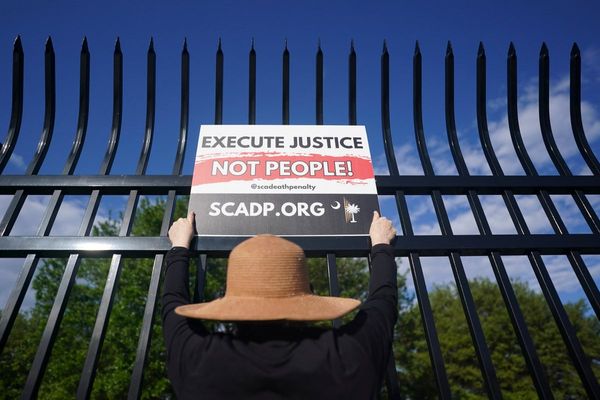RALEIGH, N.C. _ Caleb Mehlman was in ninth grade and hanging out at a friend's house the first time he took Xanax. He and his buddies knew the dangers of hard drugs like heroin and crack, but these pills seemed harmless. A doctor could have prescribed them.
Taking Xanax then became a part of life for Mehlman, said Bryce Hoover, who knew him since elementary school.
"It was just kind of the whole scene you were in," said Hoover, 19. "It's what everybody around you did."
Mehlman's addiction to the drug became more intense when a friend died in July 2015 after overdosing on prescription pills. Hoover said he and Mehlman had been using Xanax and drinking alcohol a couple of times a week, but then it turned into "an everyday thing."
"I think we just didn't care anymore," Hoover said.
Mehlman was celebrating his 19th birthday in the early-morning hours of Dec. 19 when he and his friend died after overdosing on Xanax and methadone. They are among six students or recent graduates of Leesville Road High School in Raleigh who have died in the past three years of drug-related incidents.
The opioid epidemic has garnered much attention as the death toll from heroin and drugs like OxyContin has climbed. But some families say they are also facing a quieter but deadly crisis: Xanax and other benzodiazepines.
The drugs, often called benzos, act on the central nervous system as a sedative and are often prescribed to treat anxiety. They can be especially dangerous when paired with or laced with opioids like methadone, as was the case for Mehlman.
About 9,000 people in the United States died after overdosing on benzos in 2015, according to the National Institute of Drug Abuse. Opioids were involved in about 71 percent of the deaths. That compares with about 2,000 people who died after overdosing on benzos in 2002.
Hoover, who also attended Leesville Road High School, said he and his friends would get Xanax from people they knew who bought it online. And they'd get it from local people who made the drug and sometimes "pressed" it with other drugs to make it cheaper.
"Xanax numbs what you care about _ your morals, really," Hoover said. "Xanax completely turns you into a different person. You go out and you steal stuff. You wouldn't do that when you're sober, but on Xanax it just doesn't matter. Nothing really does."
'EVERYTHING'S OK'
Mehlman was an outgoing, athletic kid who got good grades in school, according to his family. He played on Leesville Road's lacrosse team for a couple years and spent a lot of time at local skate parks where he and his friends practiced new skateboard tricks.
Mehlman went a few times to Camp Woodward, a sports camp in Pennsylvania, and some thought he could have been a professional skateboarder.
His mother, Susan Plattner, suspected he was turning more and more to drugs during high school. His grades had slipped a bit, and he was hanging out with some new friends.
"I'd search his room, do all the things that you're supposed to do as a parent," Plattner said. "Talk to him _ he was always so defensive."
Whenever his family asked him about it, Mehlman assured them everything was fine. That was his way, Plattner said _ he didn't want people to worry.
"I remember trying to ask him, 'Are you sure everything's fine?' " said Sarah Mehlman, Caleb's 24-year-old sister. "I'm your sister, you can tell me anything. I'm not going to say anything. And he was like, 'Everything's OK, Sarah. Everything's fine, you don't have to worry about me ever.' "
The severity of the problem became clear when Mehlman went into a drug-induced psychosis last year after a spring break trip to the beach. Plattner said he started hallucinating after days of taking a mixture of drugs and not sleeping. He spent a few days at the hospital and recovered.
"He downplayed it _ 'It was just spring break,' " Plattner said.
Mehlman headed to East Carolina University last fall, although Plattner had urged him to hold off on college. She wanted him to go to rehab.
When Plattner picked up her son for Christmas break, he talked about his future and his girlfriend who he'd been dating for four years.
"He said, 'You know, Mom, I never thought I'd get married, but I'm going to marry (her) one day,' " Plattner recalled.
He died about two weeks later. He and his friends had been drinking and taking pills that night. When Mehlman and one of his friends still weren't up the following afternoon, another friend became alarmed and asked for help. But it was too late.
The News & Observer is only naming the teens whose families have agreed to talk publicly.
WITHDRAWAL
Hoover said he and Mehlman started smoking marijuana in the fifth grade. By senior year, he said, lots of people were taking Xanax.
That's a common pattern _ marijuana first and then benzos, said Britta Starke, program director for Alcohol and Substance Abuse Outpatient Treatment at UNC. As the high from marijuana wears off, some people turn to sedatives.
It's easy to become dependent on benzos, said Dr. Robyn Jordan, a psychiatrist at UNC-Chapel Hill. Withdrawal symptoms include headaches, blurred vision, diarrhea, and panic.
"In the morning, you wake up in benzo withdrawal, so you need to take your Xanax to feel better until midday," Jordan said. "Then you'll go through withdrawal and need to take another Xanax."
Hoover said he and Mehlman became dependent. "You'd be in bed and wake up and find a Xanax and go back to bed," he said.
Starke recommends a more natural way to deal with stress and anxiety: mindfulness. That could include meditation and deep-breathing techniques, or "20 minutes a day of just relaxing and chilling and getting grounded," Starke said.
"I don't care if it's walking their dog for 20 minutes," Starke said. "Something like that has a far more long-term effect in reducing anxiety than taking Xanax."
Hoover said he's clean now, and working full time at Home Depot. He still likes to skateboard _ to decompress, to refocus.
"I made some promises to many people and I've been off the pills for a while now," he said.
He has a picture of Mehlman and the other teen who died taped to the steering wheel of his car. A funeral pamphlet for another friend who died of an overdose in January is taped the car's visor. He got Mehlman's name tattooed on his wrist, along with a broken skateboard.
His friends weren't just friends, Hoover said. They were family.
'STREET TRICKS AND BIG JUMPS'
Mehlman's funeral was packed with family and friends.
"I knew (Caleb) was a great kid, but I didn't realize until the day of his funeral ... these people were just so touched and so shattered," Plattner said. "So many people were shattered. So many people thanked me for having him."
An online fundraiser in honor of Mehlman has garnered more than $12,000. Donations will go to a charity to benefit youth, sports and healthy living.
"We will always remember Caleb doing street tricks and big jumps," the website says. "We miss you every day and will use this money in your memory."
Plattner said she tells her story to anyone who will listen in hopes of spreading the message that people should call 911 immediately if someone is in danger after taking drugs.
"We have to try to save other lives," she said.
And she wants families to know that this could happen to anyone.
"People tell me all the time, 'I can't imagine,' " she said. "And I tell them, 'I can't either. But I'm living it.' ... I don't know what the answer is. But I'll do whatever."
Whatever it takes to not have to go to another funeral.







